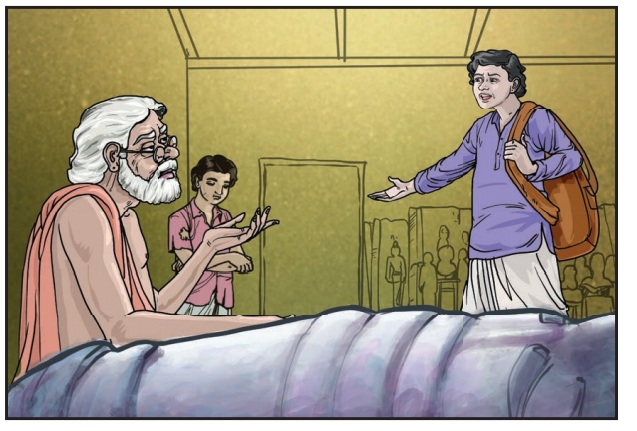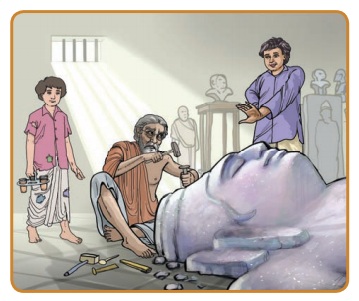Prose - Term 2 Unit 2 - 7th English - The Last Stone Carver: Section I | 7th English : Term 2 Unit 2 : Prose : The Last Stone Carver
Chapter: 7th English : Term 2 Unit 2 : Prose : The Last Stone Carver
The Last Stone Carver: Section I
UNIT 2
Prose
The Last Stone Carver

Section
I
READING
Listen to the teacher read this section.

The young man flung the hammer and the chisel to
the ground and cried, “I’m leaving Father. I’m leaving you and this work. Look what
it’s brought us!”
He spread out his arms and glanced indifferently
at the small, congested work room. The
white washed walls were stained by many monsoons.The window, bare of curtains, opened
into a tiny backyard.
“After all these years of work, this is all we have
– nothing, nothing. This kind of work just doesn’t pay!”
The old man stared at his son in surprise. Although
his voice trembled, it didn’t lose its usual gentleness. “It’s not only the money
that matters, son. It’s the service, our service to God.”
“Father,” the young man grunted impatiently, “times have changed. The stone
carver’s work has changed too. You can’t live on sculptures for temples only. You
have to mass produce, mass produce like all the others in Agra. Come on, Father!
Wake up.”
The lines around the man’s mouth tightened. “No,
my son. This is the work I learnt from my father. And he learned from his father.
We have kept up this tradition for hundreds of years... and I hoped you would continue
our work.”

“No, Father” the young man replied with determination.
"I’m tired of working for a pittance for the committee of the temple in Srinagar.
I’m leaving, Father.”
The young man moved angrily out of the room, leaving
his old father crouching in front of a
half-finished marble statue. He dropped his hands into his laps, and closed his
eyes. He began to pray and didn’t even hear the hesitant ‘goodbye’. His son called
out from the door.
“Masterjee!” called Salim, the servant boy,
entering the workshop barefooted. He held out a glass of steaming tea in his hand.
“Masterjee?” he asked once more, his voice filled with concern.
The old man looked up. His face was ashen. He looked
tired. He called the boy to come closer and motioned him to sit down.
“Salim,” he said gently, “soon I will be the last
stone carver here. All the others would have gone to Agra. There they are turning
out cheap candlestands, paperweights and ashtrays by the dozen. They are making
money, but they betray our skill, our age-old tradition. Now Gopal has also gone.
I’ll have to finish this sculpture alone. And with the help of God, I’ll do it,
Salim. "I know you will, Masterjee,” the boy answered. “You’ll make many more."
The old man looked at the orphan boy who had come
to work for him five years ago. Drenched to the skin, dressed in tatters, he had
begged for shelter during monsoon storm. And had stayed on to work for the old master craftsman.
He had grown tall and strong. The old man knew that Salim too would leave him one
day.
He shook his head.”My strength is waning. I can’t
work with the chisel like I used to. Carving takes too long, much too long. Then
he straightened up and said with fresh determination, “I’ll have to finish this work. And surely I will.”
“Yes, you will,” the boy repeated offering his master
the glass of tea. “Drink please.
It will do you good.” Then he added, “I have to
go to the market for an hour or two. But I’ll be back in time to prepare dinner.”
The old man nodded. The old man sighed and picked up the chisel and hammer. The
cool metal of the tools filled him with happiness and confidence. He loved his work,
and didn’t want to change it for any other in the world.
GLOSSARY
congested - overcrowded
grunted - made a low sound
crouching - sitting on heels
determination - firmness to do something
Which
of the two sentences given below convey the following meaning?
1. stained by - mark made on clothes or materials
The white washed walls were stained by many monsoons.
______________
a. The walls were made dirty by rains.
b. The Monsoon removed the dirt from the walls.
2. working for a pittance – working for very little
money
I am tired of working for a pittance.
a. He didn’t want to work because he was tired.
b. He didn’t want to work as he gets low income
for his work.
3. ashen – pale
His face was ashen.
a. He looked pale and dull.
b. He looked bright and cheerful.
4. drenched – thoroughly wet
He is drenched to the skin. ______________
a. He is thin and skinny.
b. He is thoroughly wet.
Additional questions :
1. How did the old man earn his
living?
The
old man earned his living by carving stones for the temple.
2. What did he use for his work?
He
used a hammer and a chisel for his work.
3. What was the workroom like?
The
workroom was small and congested. The walls were stained by many monsoons. The
window was without curtains.
4. What did his son tell him?
Why?
His
son said that he was leaving for Agra because that kind of work did not pay
them well.
5. Why did the old man continue
to do the work?
The
old man felt that money didn't matter. He felt that it was a service to God.
6. Who was Salim? What did he
bring the old man?
Salim
was the servant boy. He brought the old man a glass of steaming tea.
7. What was the old man like?
The
old man's face was ashen. He looked tired.
8. Why do the stone carvers go to
Agra?
In
Agra, the stone carvers could turn out cheap candlestands, paper weights and
ashtrays by the dozen. It gives them more money. So the stone carvers go to
Agra.
9. What do you know about Salim?
Salim
was an orphan boy. He came to work for the old man five years ago. When he came
there he was wet to the skin and he begged for shelter. He had then stayed on
to work for the old master craftsman.
10. How did the old man feel when
he picked up the hammer and chisel?
When
the old man picked up the cool tools he was filled with happiness and
confidence.
Paragraph writing
1. Describe the events leading to
the old man’s son leaving him.
The
old man was a master craftsman. He carved stones to make statues for the
temple. Gopal was his son. One day his son came to him. He said that he was
tired of working for a pittance. He added that he could earn more if he went to
Agra. So he took leave of his father and quit the place. On hearing this his
father was broken-hearted. He was sad that there was no one after him to keep
up the age-old tradition.
2. What do you know about Salim
and his master?
Salim
was an orphan boy. He came to the old man five years ago. When he came there he
was in tatters. He was drenched to the skin. He asked for shelter. He stayed to
work with the old man. Soon he had grown tall and strong. Salim was helpful to
the old man. He took care of him prepared food for him.
Related Topics